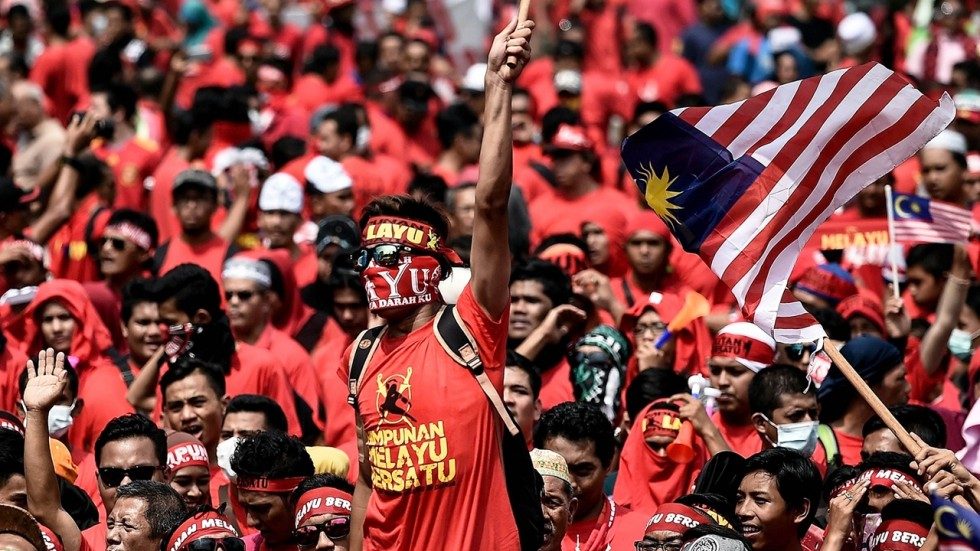Politics, economics and religion are to blame for a growing trend in Indonesia and Malaysia, writes Hew Wai Weng.
Lately, Indonesia and Malaysia have been treading the same despicable and dangerous path.
In Indonesia we have witnessed the racially-linked attack at a Transjakarta bus stop, the attack on Buddhist temples in Tanjung Bilai, and racially-framed attacks on Jakarta Governor Basuki Tjahaja Purnama (best known as Ahok) by some of his opponents.
Malaysia has seen a ‘pro-Malay’ red shirt rally in Kuala Lumpur, racist statements made by leaders in right wing groups such as ISMA (Ikatan Muslimin Malaysia) and Perkasa, and the allegation by some UMNO (United Malays National Organisation) leaders that the largely Chinese DAP (Democratic Action Party) will undermine the political position of ethnic Malays.
Such incidents have left some asking whether there is a rise of ‘anti-Chinese’ politics in both countries.
There is no simple answer, and many different ways of viewing the recent increase of expressions against ethnic Chinese among some segments in Indonesian and Malaysian societies.
Malaysia and Indonesia share similar demographics – Muslim majority countries with a sizeable Chinese minority who are mostly non-Muslims. Yet they also went through different political, social and economic changes. Therefore, while parallel patterns do exist, we must also remember to situate ‘anti-Chinese’ politics in broader contexts, and not overlook different trajectories and contingencies of this development in each country.
However, for me, three features and their intersection are common to both countries and underpin the rise of anti-Chinese rhetoric. These are political contestation, economic disparity and religious differences.
First, political contestation.
There has always been suspicion about the growing political influence of ethnic Chinese and concerns that they will take power among some segments of non-Chinese Malaysians and Indonesians. Yet, while such rhetoric remains influential, political contestation today is much more complicated.
In Malaysia, the fragmentation of Malay-Muslim politics, together with the weakening dominance of UMNO has led to the popularisation of ‘anti-DAP’ sentiment, which unfortunately has been conflated with ‘anti-Chinese’ language among some UMNO leaders and supporters.
Similarly, in Indonesia, traditional political elites and their fear of losing power to rising and popular Chinese figures such as Ahok stir ‘anti-Ahok’ sentiment. This has also unfortunately led to some ‘anti-Chinese’ statements.
Second, economic disparity.
Even though there are increasing numbers of non-Chinese business elites and members of the middle class, the perception that ethnic Chinese are economically better off is still quite prevalent.
However, what drives anti-Ahok and anti-DAP attitudes today has more to do with their perceived pro-middle class, pro-developer and pro-meritocracy policies – in which some old villages or informal settlements have been demolished for urban redevelopment and poor people might have been marginalised. Dissatisfaction with Ahok’s and DAP’s economic policies, respectively in Jakarta and in Penang, has transformed into ‘anti-Chinese’ sentiments among some people.
Third, religious differences.
Religion has complicated political contestation and economic disparity in both Indonesia and Malaysia. Religious differences not only exist between Muslims and non-Muslims, but also among Muslims who have different attitudes towards the role of Islam in the public and political spheres.
Yet, non-Muslims — often linked (yet not exclusively) to ethnic Chinese — have been perceived by some Muslims as a threat to Muslim solidarity.
For example, progressive leaders in Malaysia’s Islamic-based party Amanah have been labelled as ‘DAP’s agent’, while some progressive leaders in Indonesia’s Nahdlatul Ulama have been seen as too ‘Chinese-friendly’. There are even some baseless accusations that DAP wants to establish a ‘Christian state’ and Ahok aims to ‘Christianise’ Jakarta.
The suspected growing political power of ethnic Chinese camouflages the polarisation of Malay politics and the insecurity of political elites in Indonesia. Meanwhile, the alleged Chinese dominance in the economic field conceals rising intra-ethnic inequality, especially in Malaysia. At the same time, the purported ‘Christianisation’ effort disguises the internal dynamic among Muslims.
Yet, the intersection of political contestation, economic disparity and religious differences underpin the recent ‘anti-Chinese’ remarks and incidents in both Malaysia and Indonesia.
Hew Wai Weng is Visiting Fellow at ISEAS-Yusof Ishak Institute.
 Facebook
Facebook  Twitter
Twitter  Soundcloud
Soundcloud  Youtube
Youtube  Rss
Rss 